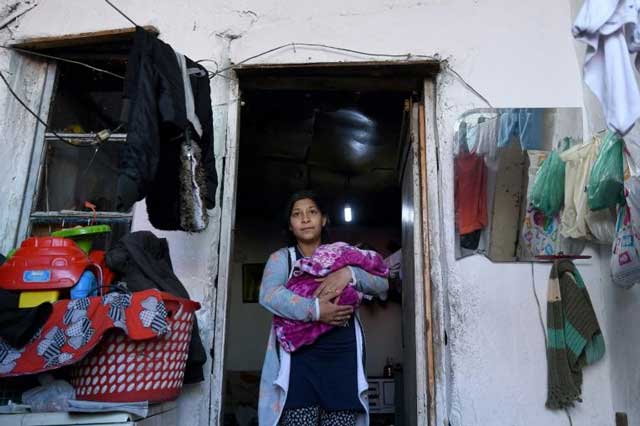
Tirana, Albania | AFP | Inside a dark shack outside Albania’s capital, 18-year-old Mirela tries to soothe her newborn with the only food she has: a can of powdered milk scrounged from a rubbish bin.
“But what to do after that?” the young mother asks, as she cradles her baby in the ramshackle home she shares with a dozen others on the outskirts of Tirana.
For Mirela and hundreds of thousands of other Roma living in slums across the Western Balkans, the first symptom of the coronavirus pandemic has been hunger.
Curfews and other lockdown measures have wiped out income for families who live hand-to-mouth, often by selling scraps of plastic and metal scavenged from bins.
Now that business is on hold, piles of waste are festering in Mirela’s neighbourhood, shrouding it in a putrid odour.
“Everything is blocked, we don’t have anywhere to sell (the recyclables) and for food we also have to go through the garbage to find something to eat, like pasta and rice,” said 15-year-old Vanesa Lika, another teenage mother living in the shantytown in Breglumas.
The community of around 40 Roma are still going out daily to collect bottles and cans in hopes that business will soon resume — even though they fear contamination from rummaging through other people’s waste.
“We know that (the bottles) can carry the virus but there’s nothing we can do,” said Mirela’s mother-in-law, Lindita Vogli.
“Poverty forces you to try everything.”
– Exposed –
While the virus infects rich and poor alike, its deadly march has exposed the globe’s inequities, revealing how safety measures like social distancing, regular hand-washing and teleworking are privileges only some can enjoy.
In the Balkans, a long history of discrimination has spun Roma and other minorities into cycles of poverty, making them especially vulnerable to the virus and its economic shock.
With education gaps and prejudice closing off many job opportunities, the vast majority of Roma work informally, in waste sorting, as day labourers or in brass bands in the street.
Over the past month, these “grey zone” jobs and meagre wages have vanished.
In Suto Orizari, one of the region’s largest Roma neighbourhoods outside the North Macedonia capital Skopje, the normally bustling market of cheap clothes and goods that sustains the community has gone dark.
“These people are at both health and humanitarian risk,” said Dragan Gracanin, who leads an organisation for coordinating Roma initiatives in Serbia.
“If they are hungry they will be forced to get out and work, and therefore be exposed to infection.”
– No water –
The virus has killed more than 250 people and infected nearly 10,000 in the Western Balkans, one of Europe’s poorest regions.
Although there are no reliable statistics, the World Bank estimates Roma could make up between 700,000 and 1.3 million of the region’s population.
While responses to the virus have varied by country, in some places it has taken weeks for emergency food and hygienic aid to arrive in desperate Roma communities.
For the very poorest, even the most basic precautions — such as hand-washing — can be a struggle.
“We look in the garbage bins for cans or bottles of soap and we fill them with water to wash our hands,” Lika told AFP, as she tried to calm a coughing baby.
Less than half of Roma in Albania have piped water at home, according to a UN survey.
In Serbia, one of the more developed countries in the Balkans, more than 5,300 Roma families have reported a lack of access to clean drinking water, while two thirds of homes are not connected to a sewerage system.
Faced with coronavirus concerns, local authorities in Serbia have only recently organised the installation of water tanks in the worst-off neighbourhoods after urgent calls from activists.
– Bread and yoghurt –
Many Roma communities are also cramped and crowded, making social distancing all but impossible.
“How can someone self-isolate if he is squatting in a two-room shack with 12 other members of his family?” asked Bashkim Ibishi, who leads the NGO Advancing Together, which works with Roma and other marginalised groups in Kosovo.
Outside Montenegro’s capital, Podgorica, one Roma father of 10 recently tested positive for COVID-19 and was taken to hospital.
Police are now guarding the community around the clock, while hundreds of families inside are subsisting on a daily ration of two loaves of bread and two litres of yoghurt provided by the Red Cross.
They have also received some other aid packages of flour, canned food, cabbage and hygiene products, all of which are thinly spread across large families.
“I am grateful for any aid, but two loaves of bread and two litres of yoghurt is not enough,” said Sahu Sefani, a 41-year-old father of seven.
Like most of his neighbours, Sefani used to eke out a living by reselling recyclables or other goods picked out from the city’s garbage.
Robbed of that income, debts have piled up, with some families unable to pay water and electricity bills until the state recently stepped in.
For now though, the most pressing need is hunger.
But should the virus extend its reach, there is concern about how a lifetime of deprivation, plus barriers to medical care, have weakened the overall health and immunity of those on society’s bottom rung.
“If you don’t have sufficient means to provide for your family,” it means “less vitamins, less everything” on the kitchen table, said Ibishi.
“And this makes you more vulnerable.”
 The Independent Uganda: You get the Truth we Pay the Price
The Independent Uganda: You get the Truth we Pay the Price


